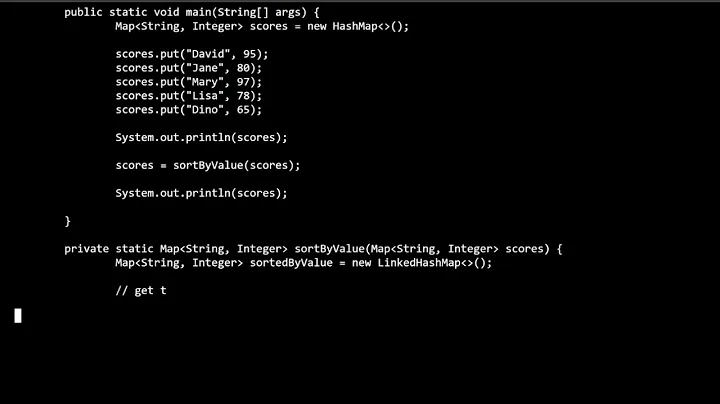Sorting HashMap by values
Solution 1
Assuming Java, you could sort hashmap just like this:
public LinkedHashMap<Integer, String> sortHashMapByValues(
HashMap<Integer, String> passedMap) {
List<Integer> mapKeys = new ArrayList<>(passedMap.keySet());
List<String> mapValues = new ArrayList<>(passedMap.values());
Collections.sort(mapValues);
Collections.sort(mapKeys);
LinkedHashMap<Integer, String> sortedMap =
new LinkedHashMap<>();
Iterator<String> valueIt = mapValues.iterator();
while (valueIt.hasNext()) {
String val = valueIt.next();
Iterator<Integer> keyIt = mapKeys.iterator();
while (keyIt.hasNext()) {
Integer key = keyIt.next();
String comp1 = passedMap.get(key);
String comp2 = val;
if (comp1.equals(comp2)) {
keyIt.remove();
sortedMap.put(key, val);
break;
}
}
}
return sortedMap;
}
Just a kick-off example. This way is more useful as it sorts the HashMap and keeps the duplicate values as well.
Solution 2
A generic version of a method to sort a Map resembles:
private static <K extends Comparable<K>, V extends Comparable<V>> Map<K, V> sort(
final Map<K, V> unsorted,
final boolean order) {
final var list = new LinkedList<>(unsorted.entrySet());
list.sort((o1, o2) -> order
? o1.getValue().compareTo(o2.getValue()) == 0
? o1.getKey().compareTo(o2.getKey())
: o1.getValue().compareTo(o2.getValue())
: o2.getValue().compareTo(o1.getValue()) == 0
? o2.getKey().compareTo(o1.getKey())
: o2.getValue().compareTo(o1.getValue()));
return list.stream().collect(
Collectors.toMap(
Entry::getKey, Entry::getValue, (a, b) -> b, LinkedHashMap::new
)
);
}
The following code offers ascending and descending sorting by value:
import java.util.Collections;
import java.util.Comparator;
import java.util.HashMap;
import java.util.LinkedHashMap;
import java.util.LinkedList;
import java.util.List;
import java.util.Map;
import java.util.Map.Entry;
public class SortMapByValue
{
public static final boolean ASC = true;
public static final boolean DESC = false;
public static void main(String[] args)
{
// Creating dummy unsorted map
Map<String, Integer> unsortMap = new HashMap<String, Integer>();
unsortMap.put("B", 55);
unsortMap.put("A", 80);
unsortMap.put("D", 20);
unsortMap.put("C", 70);
System.out.println("Before sorting......");
printMap(unsortMap);
System.out.println("After sorting ascending order......");
Map<String, Integer> sortedMapAsc = sortByComparator(unsortMap, ASC);
printMap(sortedMapAsc);
System.out.println("After sorting descindeng order......");
Map<String, Integer> sortedMapDesc = sortByComparator(unsortMap, DESC);
printMap(sortedMapDesc);
}
private static Map<String, Integer> sortByComparator(Map<String, Integer> unsortMap, final boolean order)
{
List<Entry<String, Integer>> list = new LinkedList<Entry<String, Integer>>(unsortMap.entrySet());
// Sorting the list based on values
Collections.sort(list, new Comparator<Entry<String, Integer>>()
{
public int compare(Entry<String, Integer> o1,
Entry<String, Integer> o2)
{
if (order)
{
return o1.getValue().compareTo(o2.getValue());
}
else
{
return o2.getValue().compareTo(o1.getValue());
}
}
});
// Maintaining insertion order with the help of LinkedList
Map<String, Integer> sortedMap = new LinkedHashMap<String, Integer>();
for (Entry<String, Integer> entry : list)
{
sortedMap.put(entry.getKey(), entry.getValue());
}
return sortedMap;
}
public static void printMap(Map<String, Integer> map)
{
for (Entry<String, Integer> entry : map.entrySet())
{
System.out.println("Key : " + entry.getKey() + " Value : "+ entry.getValue());
}
}
}
Using newer Java features:
import java.util.*;
import java.util.Map.Entry;
import java.util.stream.Collectors;
public class SortMapByValue
{
private static final boolean ASC = true;
private static final boolean DESC = false;
public static void main(String[] args)
{
// Creating dummy unsorted map
Map<String, Integer> unsortMap = new HashMap<>();
unsortMap.put("B", 55);
unsortMap.put("A", 20);
unsortMap.put("D", 20);
unsortMap.put("C", 70);
System.out.println("Before sorting......");
printMap(unsortMap);
System.out.println("After sorting ascending order......");
Map<String, Integer> sortedMapAsc = sortByValue(unsortMap, ASC);
printMap(sortedMapAsc);
System.out.println("After sorting descending order......");
Map<String, Integer> sortedMapDesc = sortByValue(unsortMap, DESC);
printMap(sortedMapDesc);
}
private static Map<String, Integer> sortByValue(Map<String, Integer> unsortMap, final boolean order)
{
List<Entry<String, Integer>> list = new LinkedList<>(unsortMap.entrySet());
// Sorting the list based on values
list.sort((o1, o2) -> order ? o1.getValue().compareTo(o2.getValue()) == 0
? o1.getKey().compareTo(o2.getKey())
: o1.getValue().compareTo(o2.getValue()) : o2.getValue().compareTo(o1.getValue()) == 0
? o2.getKey().compareTo(o1.getKey())
: o2.getValue().compareTo(o1.getValue()));
return list.stream().collect(Collectors.toMap(Entry::getKey, Entry::getValue, (a, b) -> b, LinkedHashMap::new));
}
private static void printMap(Map<String, Integer> map)
{
map.forEach((key, value) -> System.out.println("Key : " + key + " Value : " + value));
}
}
Solution 3
In Java 8:
Map<Integer, String> sortedMap =
unsortedMap.entrySet().stream()
.sorted(Entry.comparingByValue())
.collect(Collectors.toMap(Entry::getKey, Entry::getValue,
(e1, e2) -> e1, LinkedHashMap::new));
Solution 4
map.entrySet().stream()
.sorted((k1, k2) -> -k1.getValue().compareTo(k2.getValue()))
.forEach(k -> System.out.println(k.getKey() + ": " + k.getValue()));
Solution 5
You don't, basically. A HashMap is fundamentally unordered. Any patterns you might see in the ordering should not be relied on.
There are sorted maps such as TreeMap, but they traditionally sort by key rather than value. It's relatively unusual to sort by value - especially as multiple keys can have the same value.
Can you give more context for what you're trying to do? If you're really only storing numbers (as strings) for the keys, perhaps a SortedSet such as TreeSet would work for you?
Alternatively, you could store two separate collections encapsulated in a single class to update both at the same time?
Related videos on Youtube
prof_jack
Updated on March 15, 2022Comments
-
prof_jack over 2 years
I need to sort my
HashMapaccording to the values stored in it. TheHashMapcontains the contacts name stored in phone.Also I need that the keys get automatically sorted as soon as I sort the values, or you can say the keys and values are bound together thus any changes in values should get reflected in keys.
HashMap<Integer,String> map = new HashMap<Integer,String>(); map.put(1,"froyo"); map.put(2,"abby"); map.put(3,"denver"); map.put(4,"frost"); map.put(5,"daisy");Required output:
2,abby; 5,daisy; 3,denver; 4,frost; 1,froyo; -
prof_jack over 12 yearssee the edited version.I don't think collections.sort(mapvalues) will solve the problem
-
prof_jack over 12 yearsthis code has arranged hashmap according to the keys.what I wanted was:(2,abby; 5,daisy; 3,denver; 4,frost; 1,froyo;)i.e values are arranged according to their initials and the change get reflected in the keys...
-
prof_jack over 12 yearsI edited your code a bit and it is working as desired.thanks a tonne.
-
Rafael Sanches almost 11 yearsFor example, sorting the colors that appear on an image. It has to be fast, because we can have max_int colors.
-
Jon Skeet almost 11 years@RafaelSanches: It's not clear what the context for your comment is. What would the map be in this case anyway? You may want to ask a new question.
-
Rafael Sanches almost 11 yearsI'm just giving an example that would be useful to order the hashmap by values, in the most performant way.
-
Aditya over 10 yearsNice answer, written it in a proper way using the collections utils.
-
Aditya over 10 yearsTried for my problem and found that there needs to be a slight modification to your comparator logic, where you are not checking for null checks which should be added as map values can contain null elements.
-
Daniel F. Thornton over 10 yearsPlease be sure your code runs correctly before answering. Also consider adding comments so the questioner can better understand your answer.
-
 Admin almost 9 yearsSo great :) works 100 %
Admin almost 9 yearsSo great :) works 100 % -
Kyzderp almost 9 yearsThis only works if all the integer values are unique -- otherwise, you get strings overwritten.
-
Hengameh almost 9 yearsCan we use something like this?
Arrays.sort(hm.values().toArray()); -
Hengameh almost 9 yearsCan we use something like this?
Arrays.sort(hm.values().toArray()); -
Hengameh almost 9 yearsCan we use something like this?
Arrays.sort(hm.values().toArray()); -
Aquarius Power over 8 yearsthis sorting can be inverted? the values I need for from bigger to smaller
-
Vitalii Fedorenko over 8 years@AquariusPower See the
reversedmethod at docs.oracle.com/javase/8/docs/api/java/util/… You can apply it to the comparator returned bycomparingByValue() -
Aquarius Power over 8 yearsthe return of
Entry.comparingByValue().reversed()is incompatible with.sorted(...)expected params :(, I ended up with a reversed loopforover.entrySet().toArray(), may be a cast could solve it, I need more time to test :) -
Vitalii Fedorenko over 8 years@AquariusPower you don't need casting, just give the compiler a hint on what the generic type is:
Entry.<Integer, String>comparingByValue().reversed() -
Radiodef about 8 yearsThis doesn't adhere to the
Mapinterface. A proper implementation ofentrySet()is: "Returns a Set view of the mappings contained in this map. The set is backed by the map, so changes to the map are reflected in the set, and vice-versa." Same thing forvalues(). -
picmate 涅 about 8 yearsPlease be aware that the given algorithm has a time complexity of O(n^2) due to repeatedly looking up in values in two while loops. Converting the Entry Set to a List and then sorting the List based on a comparator would be a more efficient solution.
-
MayurB almost 8 yearsMap<Long,Employee> empidToEmployee; Sort map by employee salary.. How can we attach this problem.
-
Jon Skeet almost 8 years@MayurB: I don't understand your comment at all, I'm afraid. But maps are usually unordered.
-
MayurB almost 8 yearsI have map of employeeID to Employee object.Employee object has name id, salary attributes. I want to sort the map by employee salary. This was a interview question asked to me.
-
Jon Skeet almost 8 years@MayurB: Well normally even if a map is ordered, it's ordered by key in some way. With the context you've given, the question doesn't make much sense.
-
Andrei over 7 years@VitaliiFedorenko how can I mention comparator object in this syntax? My map is
Map<SomeObject, Integer>, where do I inject the comparator there? -
Andrei over 7 yearsLet me clarify my question. My map is
Map<SomeObject, Integer>, and I want to sort by value desc, do I need to inject the comparator there? -
 Tanuj Verma over 7 yearstypos in it should be else if ((val1 != null) && (val2 != null)) { return val1.compareTo(val2); } in compare method
Tanuj Verma over 7 yearstypos in it should be else if ((val1 != null) && (val2 != null)) { return val1.compareTo(val2); } in compare method -
Shashank over 7 yearsAwesome just what i was looking for
-
1813222 about 7 yearsmost readable solution for me and does the job, e.g. running over a HashMap sorted by values
-
 NaveeNeo almost 7 yearsI tried executing this code, runs fine with
NaveeNeo almost 7 yearsI tried executing this code, runs fine withimport java.util.Map.Entry;'But the same code does not run withimport java.util.*;The later includes the former according to my knowledge. Then why it gives an error? -
 Srujan Barai over 6 yearsWhat if I want to sort it by the length of the
Srujan Barai over 6 yearsWhat if I want to sort it by the length of thevalue, which for example is a String? -
Justin Patel about 6 yearsNice one. Thanks for this.
-
Caveman about 6 yearsSimple and elegant
-
 hephestos about 6 yearsand this kind of programming exactly is the reason that I hate jdk8. getKey,getValue, (e1,e2)->e1, ::new... then we can summon "wooloh loh" around the fire and call the spirits of night...
hephestos about 6 yearsand this kind of programming exactly is the reason that I hate jdk8. getKey,getValue, (e1,e2)->e1, ::new... then we can summon "wooloh loh" around the fire and call the spirits of night... -
Tushar Banne almost 6 yearsif values are same, will the above code sort by keys?
-
 Rais Alam almost 6 years@TusharBanne I have added new version which will support sorting based on key if values are same. Hope this will help you
Rais Alam almost 6 years@TusharBanne I have added new version which will support sorting based on key if values are same. Hope this will help you -
 Ram almost 6 yearsHere
Ram almost 6 yearsHereList<Entry<String, Integer>> list = new LinkedList<Entry<String, Integer>>(unsortMap.entrySet());, why notArrayList? -
 Onic Team about 5 years@JonSkeet: I am not getting your last line Can you please elaborate? Actually, I have student data example- name, rollNo, and 3 subject marks m1,m2,m3. Q - Sort Student data according to their total marks m1+m2+m3. Note - without using comparator and Comparable interface
Onic Team about 5 years@JonSkeet: I am not getting your last line Can you please elaborate? Actually, I have student data example- name, rollNo, and 3 subject marks m1,m2,m3. Q - Sort Student data according to their total marks m1+m2+m3. Note - without using comparator and Comparable interface -
 Onic Team about 5 years@JonSkeet: map.put(ss.getTotMarks(), ss); --- ss is my student object but if two student total marks are equal then older object replaced by new, I am using TreeMap
Onic Team about 5 years@JonSkeet: map.put(ss.getTotMarks(), ss); --- ss is my student object but if two student total marks are equal then older object replaced by new, I am using TreeMap -
Jon Skeet about 5 years@VedPrakash: Well yes, if you store a map using the total marks as the key, you shouldn't expect to be able to store two values with the same total marks. I suggest you ask a new question with more details about the problem you're facing.
-
 Onic Team about 5 years@JonSkeet: Sure
Onic Team about 5 years@JonSkeet: Sure -
 Onic Team about 5 years@JonSkeet: As per your suggestion- I have asked a new Question on StackOverflow and waiting for the expected solution from StackOverflow because last hope is the StackOverflow - link - stackoverflow.com/questions/56352075/…
Onic Team about 5 years@JonSkeet: As per your suggestion- I have asked a new Question on StackOverflow and waiting for the expected solution from StackOverflow because last hope is the StackOverflow - link - stackoverflow.com/questions/56352075/… -
Vargan over 4 yearsThe major problem with this approach is the quadratic time that it needs because of the nested while loop. There are better answers, like the excellent one from Rais Alarm down here.
-
 Woden about 4 yearsshort and straightforward; elegant and readable.
Woden about 4 yearsshort and straightforward; elegant and readable. -
Tuğrul Karakaya almost 4 years....sorted(Map.Entry.comparingByValue((a,b)-> b-a))...
-
 Rohan almost 3 yearsthis prints in the descending order of the values of map, how can i force it to ascending order?
Rohan almost 3 yearsthis prints in the descending order of the values of map, how can i force it to ascending order? -
givexa almost 3 years@RaisAlam What instead of one single char as keys, we have words like AAA and AAB, how can we can we put it alphabetically then?
-
Kishy Nivas over 2 yearsremove the minus from k1.getValue() @Rohan






